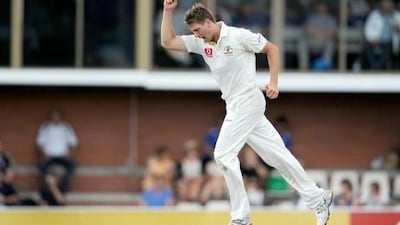Pressure mounted on Phil Hughes after he again failed with the bat as Australia chased New Zealand's modest 150 on an eventful opening day of the second Test at Bellerive Oval on Friday.
The under-fire opener lasted just five balls before he was again caught in the slips off Chris Martin for four, as Australia reached 12 for one before rain ended play early.
For the third straight time in the series Hughes was caught by Martin Guptill off Martin's bowling, scoring just 21 runs in the process, heaping pressure on his Test place ahead of this month's series with India.
A total of 11 wickets tumbled in 50 overs on a bowler-friendly Bellerive wicket with Michael Clarke winning perhaps the most crucial toss of his eight Tests as Australian captain and sending the Black Caps into bat.
At the close, David Warner was on seven and Usman Khawaja, who had lived dangerously, was on one. Martin had one for 12 off 2.2 overs.
Kiwi skipper Ross Taylor set three slips and three gullys for Hughes, who now has been caught behind the wicket in 20 of his 30 Test dismissals, raising questions over his technique.
Pace newcomer James Pattinson earlier starred with five wickets for the second consecutive innings as New Zealand were skittled out in 45.4 overs.
"I think 150 on any wicket is under par, I don't think it's enough, but saying that if they bowl really well you don't know what could happen," Pattinson said.
"We've definitely got the talent in our batting to get a big score, so hopefully the sun will come out tomorrow and this wicket does change when the sun's on it so hopefully that can happen and we can cash in on it."
Pattinson followed up his man-of-the-match five for 27 in last weekend's nine-wicket win in the first Gabba Test to snare five for 51 and will be on a hat-trick with his first delivery in the Kiwis' second innings here.
Dean Brownlie was the only Black Cap batsman to offer resistance with 56 off 85 balls as the Kiwis rolled over for 150, the same score they posted in the second innings in Brisbane.
It was Brownlie's second half-century of the series following his unbeaten 77 at the Gabba.
"We felt the pitch was doing quite a bit so we feel we've got the runs on the board. To get that early breakthrough was excellent," Bronwlie said.
"We feel like we're in the game, definitely."
Peter Siddle played a strong supporting role to Pattinson with three for 42 off 13 overs while Mitchell Starc claimed two for 30.
The Kiwis, who lost influential allrounder Daniel Vettori on the morning of the match with hamstring trouble for Trent Boult to make his Test debut, were 83 for six at lunch.
The wicket was always going to test the first side out to bat and New Zealand duly laboured.
Guptill survived just three balls before he edged Siddle to wicketkeeper Brad Haddin for three in the day's second over.
Jesse Ryder, promoted to number three, was out for a six-ball duck after Pattinson called for a review after English umpire Nigel Llong turned down his lbw appeal.
Skipper Ross Taylor was out for six not offering a shot to a Siddle in-swinger and was also confirmed lbw after a review.
Kane Williamson was caught glancing Starc down the leg-side for 19 and Brendon McCullum was out to a great ball from Pattinson, giving Haddin his third catch of the innings for 16.
Wicketkeeper Reece Young followed for a duck, chopping the ball on to his stumps for Pattinson's third wicket, while Doug Bracewell was caught at slip by Clarke off Siddle for 12 and Tim Southee was bowled playing on to Starc for 18.
Once Brownlie fell, playing on to his stumps to Pattinson, the end was nigh and Martin was bowled middle stump next ball by Pattinson to end the innings.
Australia have not lost any of the nine Tests played at Hobart's Bellerive Oval, while the Kiwis have not won in Australia since 1985.
sports@thenational.ae

